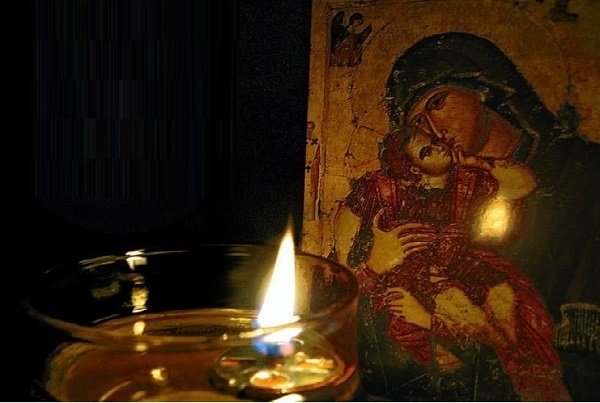“For our Archbishop…”
20 February 2022On the Feast of the Nativity (Christmas Day), we join the shepherds of Bethlehem and the wise magi of the East in their rush to the Holy Cave, to worship the King. We are amazed by the extreme humility of Jesus, who was willingly placed in a manger of animals! The poverty of the Cave does not change the fact that our Lord Jesus Christ is the “King of Kings” (among other titles) and the eternal glorious High Priest, as St. Paul reveals to us in his Epistle to the Hebrews: “So also Christ did not glorify Himself to become High Priest, but it was He who said to Him: You are My Son, Today I have begotten You“ (5:5); He is “Called by God as high priest” (5:9-10; Psalm 110: 3-4). Our Lord Jesus Christ, together with the royal (see John 18:37) and the Prophetic offices, also exercises the Priestly office. This is why He appears in some icons in hierarchical vestments as the High Priest, who abolishes the priesthood of Aaron’s successors and inaugurates a new kind priesthood (Hebrews 8:7 and subsequent verses).

“Therefore He is also able to save to the uttermost those who come to God through Him, since He always lives to make intercession for them“ (Hebrews 7:25). The Apostle Paul reveals something wonderful: that Jesus was “made higher than the heavens” (Hebrews 7:26) and sits at the right hand of the glory of God the Father. As High Priest “He offered up Himself” and serves in the Holy of Holies, which is the true heavenly Tent of Meeting that is not set up by man, but by God. The illustration of this heavenly worship is the worship offered by the priests on earth (see Hebrews 7:27 and 8:5).
Jesus, as He offered the Mystery of the Eucharist to His Disciples at the Last Supper, commanded them to do the same for themselves and their successors, the Bishops. We know from the Holy Tradition of the Church that the Lord Himself made James (known as the ”Brother of God”) the first Bishop of Jerusalem. It is striking that James, despite not belonging to the Twelve Apostles, enjoyed the respect of all. A letter of James, the Brother of God, is included in the New Testament. Also the first and oldest Divine Liturgy that was established to be performed in the Church of Jerusalem is named after St. James, the Brother of God, whose memory the Church celebrates on the Sunday after Christ’s birth.
And so the work of the Holy Apostles was continued and continues to this day through their successors, the Bishops who are assisted by many Presbyters – Priests and Deacons. Their duties have been defined by the decisions of the Ecumenical Councils, so that everything is done in order. St. Ignatius of Antioch writes: “Only the Divine Eucharist which has been blessed by the local Bishop, or of someone whom he has appointed to do so, is considered valid” (ΒΕΠ. Αποστολικής Διακονίας Αθήνα 1955, 2, 281).
The Saint also writes that during the Divine Liturgy, the Bishop is “the representative of Christ” and the Priests “represent the Apostles.” The Divine Liturgy is the Last Supper itself, in which all the faithful are together with Christ and the Twelve (the Bishop and the Priests). One by one the faithful are united – says St. Ignatius – with a faith in the name of Jesus Christ, obeying the Bishop and the Priests with their unity unbroken, sharing in one Bread (B 2: 268). Believers are one with the Bishop, as Christ is with the Church (see 2: 2: 265). And St. John Chrysostom adds: “The Bishop brings down to us the heavenly blessings and raises our supplications to God” (PG 56: 131).
Christians feel the spiritual dangers that ministers (Bishops, Priests, Deacons) face in their work, especially during the Divine Liturgy. That is why they pray to God for them. The Deacon proclaims: “For our Archbishop (Name), for the honorable presbyterate (that is priests), for the diaconate in Christ, and for all the clergy and the people, let us pray to the Lord”. The congregation responds to the Deacon’s exhortation with a warm “Lord have mercy”. In other words: Lord, have mercy on our Father Bishop, priests, Your Deacons, and all of us.
This prayer of the Church for her spiritual shepherds has enormous power. Let us remember the effect of the prayer of the faithful of Jerusalem for the Apostle Peter, who had been imprisoned by King Herod in order to kill him. Four groups of four soldiers successively guarded Peter in prison, where he was bound with two chains. Suddenly, an Angel of the Lord frees him from his shackles, opens all the doors without alerting the guards, and Peter appears free in the place where the Church prayed for him. The powerful secret weapon of the Christians: Prayer! In the Acts of the Apostles, we see that while Peter was in prison, the church unceasingly prayed to God for him (see Acts 12:17).






